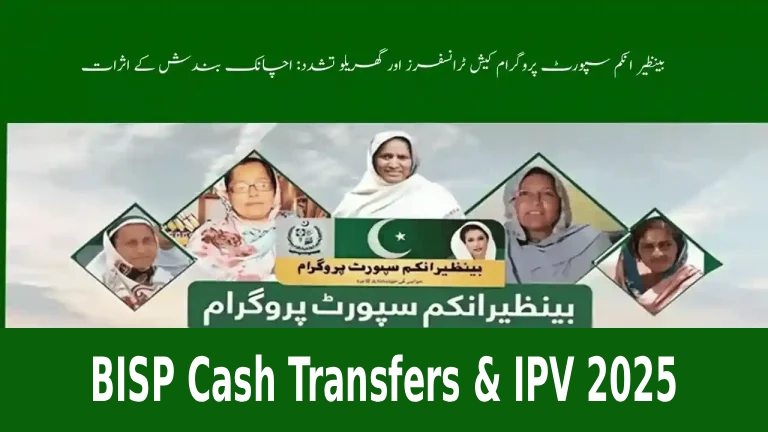
Introduction:
BISP cash transfers & IPV 2025 have become a crucial topic in Pakistan’s social support landscape. These financial aid programs, run by the Benazir Income Support Program (BISP), not only help alleviate poverty but also significantly reduce intimate partner violence (IPV). Understanding how these cash transfers empower women and ease family stress is essential for grasping their long-term social benefits.
What is BISP Cash Transfers & IPV 2025?
The Benazir Income Support Program (BISP) is a flagship social safety net launched in 2008 in Pakistan. It provides unconditional cash transfers to the poorest households to improve overall living standards. In 2025, BISP cash transfers continue to play an influential role, especially in reducing IPV, by easing financial burdens on vulnerable families.
Intimate partner violence refers to abuse or violence between partners in a relationship. Financial support through BISP helps lower this violence by reducing economic stress, which is often a trigger for IPV. The program aims to empower women by giving them direct access to funds, increasing their decision-making power within their households.
How BISP Cash Transfers Reduce Intimate Partner Violence (IPV)
Research shows positive correlations between cash transfer programs and reductions in IPV. BISP’s unconditional cash transfers help reduce household tensions by addressing poverty-related stress, a common cause of conflict. When women receive the cash directly, it enhances their authority in family decisions, promoting respect and reducing violence.
The financial independence and improved economic stability provided by BISP cash transfers reduce power imbalances often exploited in IPV scenarios. This support creates safer environments for women, leading to healthier families and communities.
The Impact of Sudden Discontinuation of BISP Cash Transfers
Suddenly stopping BISP cash transfers could reverse gains made in IPV reduction and poverty alleviation. Many women depend on these funds for basic needs and household expenses. Abrupt discontinuation increases economic stress, which might lead to more frequent or severe IPV cases.
Experts warn that removing beneficiaries without proper assessment or transition plans risks undermining family stability and women’s empowerment. Careful management and transparent evaluation are crucial to continue the positive social impacts of BISP cash transfers.
Benefits Beyond IPV: Women’s Empowerment and Poverty Reduction
Besides lowering IPV, BISP cash transfers contribute to overall poverty reduction by increasing household consumption and access to basic services like education and health. With cash in hand, women can invest in improving their children’s futures and household well-being.
Empowerment through financial resources enables women to participate more actively in decision-making at home and in the community. This empowerment fosters greater gender equality and social progress in Pakistan.
Eligibility and Payment Process for BISP Cash Transfers in 2025
To qualify for BISP cash transfers, families must meet specific poverty criteria verified through surveys and assessments. Eligible women receive payments directly through banking or mobile money services, ensuring efficiency and transparency.
The payment process has evolved with technology to reach even remote areas, making it easier for beneficiaries to access funds. Regular updates on eligibility and payment schedules are published for public awareness.
How to Check BISP Eligibility and Payment Status
Beneficiaries can check their eligibility and payment status easily online or via SMS by providing their CNIC numbers. This transparency helps recipients stay informed and report any issues promptly.
The government and BISP support centers also assist families in resolving payment-related concerns or updating their information to remain enrolled in the program.
The Role of Government and NGOs in Supporting BISP and IPV Reduction
The Pakistani government collaborates with various NGOs to enhance the impact of BISP cash transfers on IPV reduction. Awareness campaigns, counseling services, and legal aid are often integrated to support women comprehensively.
These combined efforts ensure that cash transfers are part of a broader strategy addressing root causes of violence and poverty, creating sustainable social change.
Future Outlook: Strengthening BISP Cash Transfers & IPV Initiatives
Going forward, it is crucial to maintain and expand BISP cash transfers with careful monitoring of beneficiaries’ needs. By continuing to empower women financially and socially, Pakistan can achieve notable reductions in IPV and poverty rates.
Innovations in digital payment systems and beneficiary tracking could improve service delivery, while advocacy for women’s rights will strengthen the program’s social impact. Collaboration among stakeholders is essential for sustained success.
FAQs About BISP Cash Transfers & IPV 2025
Q1: What is the main goal of BISP cash transfers?
A1: The main goal is to provide unconditional financial aid to the poorest households to reduce poverty and empower women, helping lower instances of intimate partner violence.
Q2: How do BISP cash transfers help reduce IPV?
A2: By reducing financial stress and increasing women’s control over household resources, BISP cash transfers lessen conflicts and power imbalances that often lead to IPV.
Q3: Can BISP cash transfers be stopped suddenly?
A3: Sudden discontinuation is risky as it may increase economic stress and IPV. Careful handling and transition plans are required to avoid negative social impacts.
Q4: How can beneficiaries check their BISP payment status?
A4: They can check their status online or via SMS using their CNIC number for timely information about payments and eligibility.
Q5: Are there other support services linked to BISP for IPV victims?
A5: Yes, various NGOs and government programs provide counseling, legal aid, and awareness campaigns alongside cash transfers for comprehensive support.
Conclusion
BISP cash transfers & IPV 2025 continue to be a lifeline for millions of poor families in Pakistan. These financial supports not only alleviate poverty but play a critical role in reducing intimate partner violence by empowering women and easing household stress. Maintaining and enhancing these transfers with proper management will ensure long-term social benefits for marginalized communities. The ongoing focus on BISP cash transfers is key to fostering safer, more equitable families across Pakistan.

